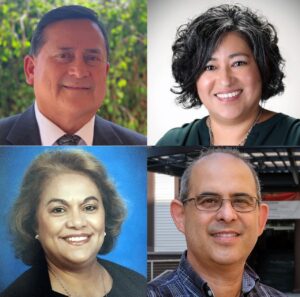By Lizzeth Mancilla
Engagement and Policy Intern

COVID-19 has disproportionately impacted communities of color in terms of COVID deaths, infections, unemployment, etc. In this LEVinar, Robert Elizondo, Superintendent of the Touchet School District; Suzy Diaz, Director of Collective Impact at Heritage University and convener of Yakima Valley Partners for Education; Maria Esther Zamora, English Language Development teacher at Spokane Virtual Academy; and Miguel Maestas, Housing and Economic Development Director of El Centro de la Raza discuss the challenges Latinos are facing with COVID-19 and what works to effectively educate Latino students.
What is your personal opinion about what you are seeing, hearing, and experiencing in and from your community about what is currently happening in this country (COVID-19, racial injustice, etc.)?
Families from Robert’s community in Walla Walla have voiced that it has been a difficult time not only navigating the pandemic but also educationally. Students who aren’t currently in a hybrid model face many challenges, as many don’t have internet access or a computer. On top of that, many parents, such as those who work in agriculture, aren’t currently working and lack the income to sustain their families. He also notes that although students’ education is important, the relationships with students is more important than ever. Many are struggling with their mental health and feel they don’t have adequate support.
Maria shared a conversation she had with a student who defined this time we’re going through as a way to define quantum physics, where nothing is predictable. She goes on to explain the hardships the Latino community faces. One challenge is the reality that the Latino population is twice as likely to get the virus compared to the rest of the population.
She echoed the challenge Robert shared about families struggling to make ends meet. Maria sees how COVID-19 has greatly impacted both the economy and Latinos as a community. Similarly, to Robert, she finds that “the people that are suffering the most are Hispanic or they’re workers that are unemployed and that don’t even know when they will be able to go back to work and generate an income that can be stable,” Maria said.
In addition, she notes the emotional impact COVID-19 has had on the Latino Population. “We [Latinos] are very sociable. We like to have that social contact. We love people, we want to feel included. And the pandemic has separated us from the world,” Maria added.
Given what is currently happening in our country, Suzy Diaz sees a greater need to advocate for her community in Yakima. “These are times that have created a lot of interruption and change. And for us here, we have to ask ourselves, who is speaking for our collective community?” Suzy said. She states that they need to ensure they are communicating with families in their language and opening the door to everyone who wants to be more involved and help out their community.
Miguel, from El Centro de la Raza, noted that although Latinos are 13% of the population in the state, they represent 35% of all positive COVID-19 cases, which greatly impacts them financially. “Many families who have lost their jobs have been impacted even worse because if the family has an undocumented member, they’re not eligible for the federal stimulus package that some people received. They are not eligible for unemployment even if their husband, wife, or children are American citizens,” Miguel explained.
Based on your experience, what works to successfully educate Latino students in our community?
Robert believes it is important for students to physically be in school. “If they’re not in school, if they don’t have internet or a place at home where they can study, we think that the best thing that we can do right now is to open the school doors,” he said. This would allow teachers to be present and allow educators to both check in with students and give them the necessary support to succeed.
Maria shared steps her school has taken to help their students succeed. Even though everything is completely remote, the school is offering opportunities for some students to access the school, such as students who come from poor families or are receiving special education services. Other successes include working with internet companies to offer free services to families, having interpreters calling to check in with families, working with parents to teach students how to use computers, etc.
In addition, Suzy offered some words of encouragement. “Our job focuses mainly on the end. So the end is a degree, a career. So I recommend that we cannot lose hope. Our students are going to make it and help our communities,” she said. Therefore, it is important to advocate for students to ensure they have the necessary support to be capable of achieving their academic goals and getting a degree.
Miguel calls for more concrete and detailed data about the Latino community. As with other communities, “We need that data for [our] community to know how to react and help. If we have information, then we can create policies and policies can create the programs that can address the crisis that we are going through,” he said.
Watch the full LEVinar here (Note: English interpretation is available by enabling closed captions. The English interpretation begins at 2:51 into the recording)
Love what we do? Support our work
Want to find out the latest in education news in Washington? Subscribe to our newsletter
Want to learn more about League of Education Voters? Find out here